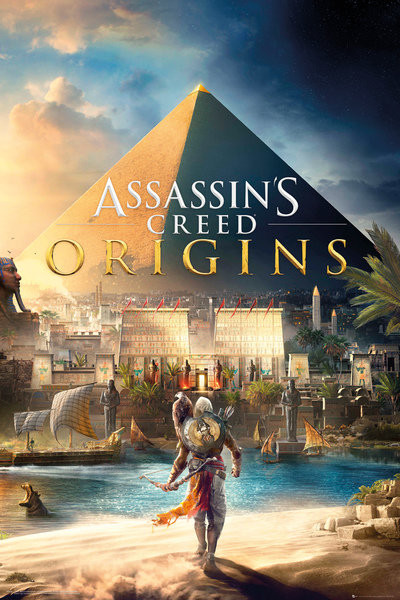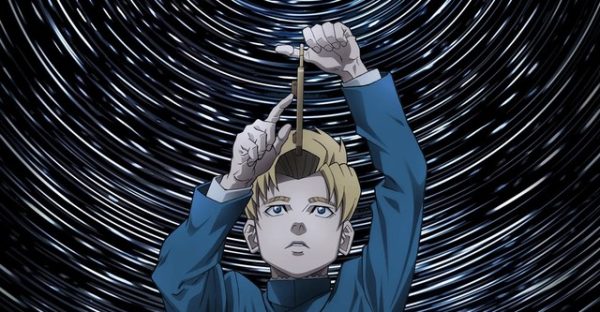Origins outshines predecessors

Cover for video game Assassin Creed Origins.’ The game was first released on Oct. 27, 2017
In the past Assassin’s Creed installments, players have scaled colossal towers in Italy, fought for the freedom of the thirteen colonies, and torn through Man-o’-Wars across the Caribbean in massive, gripping adventures that always seem to find the perfect mix between elegant plots of a man trying to discover his own morals, and gruesome combat with satisfying kills. The new installment of the series, Assassin’s Creed: Origins, now selling for $40 to $60 depending on where you purchase it, brings the velvet sand dunes and behemoth pyramids of Ancient Egypt to the table, the ensuing story sharing the same premise as the title: the origins of the assassins.
Without delving into spoilers, Origins follows the story about the protagonist and first chronological assassin, Bayek the Medjay, going on a quest to avenge his murdered son. It’s not the most breathtaking plot, but it’s interesting enough and does its job for the game. Honestly, the story isn’t the highlight of it in the first place.
What’s really important is the core game, and while it is perhaps not as great as some of its predecessors, is still one of the best installments in the series in over eight years.
Almost all previous games of the series, even the really good ones, had boring sidequests; even most main quests fell into a lull of standards. And while Origins still uses basic categories for all quests, like invading bandit camps and guard outposts to rescue a prisoner or valuable item, escorting an NPC through dangerous territory, or stalking an enemy through the shadows to eavesdrop, each mission still manages to retain a uniqueness most other quests haven’t before.
Bayek is the Medjay in Origins, and it really shows throughout the game how much he cares and wants to live up to his title; this helps enrich the story behind each quest, and makes them all feel more special. One of the first sidequests in the game, “Family Reunion,” comes to mind: the premise seems simple, being that the player has to rescue a man held prisoner by some soldiers and return him to his family. But once you reach the prison cell, it is discovered he is dead; still wanting to salvage the body, Bayek takes the corpse back to the home of its family– only to discover the rest of the family has also passed away. The player then must help bury the man, alongside his loved ones; suddenly the name “Family Reunion” has taken on a whole other meaning. Sidequest plots don’t have to be extensive and complex, they just need something to make them stand out a little more, and for the most part Origins manages to capture that.
As an added bonus to the improved quests, sidequests now have an actual incentive to complete them. I’m sure I’m not alone when I admit I skipped out on most side missions in past installments, because I just wanted to focus on the main storyline; they were boring and not as entertaining as the main chunk of the game. But with the new levelling system, the player feels compelled to complete all sidequests in the area before proceeding with the primary one, especially because the game itself tells you what level you should be at when you commence with it, and side missions are the optimal method to gaining more experience points.
The new levelling system flows excellently with the rest of the gameplay, and keeps things more exciting. While past games have definitely shown a progression with a gradual attainment of improved weaponry or cooler armor, something about actually leveling up rewards you with a much bigger satisfaction.
Accompanying the leveling system is a skill tree; each time you level up, you gain a single ability point, which you can spend on a simple skill, or save for a more advanced move you may want to learn later. I found it particularly delightful that the tree seemed divided into three primary classes: hunter, warrior and seer. While it isn’t required to stick to one class at any point, it allows for more variety and a chance at replaying the game with a new approach and new style.
For these reasons, it is a bit boggling that some critics still think the series is spiraling. Several fans of the series, including myself, have felt a gross monotony consuming the Assassin’s Creed series as it grew in popularity and became much easier for the developers to prioritize quantity over quality, pumping out a game nearly every year.
However, Origins has proven itself with its breathtaking approach to the series. The gameplay is more engaging, with newer combat systems (like using the controller bumpers to attack and block, as well as all other upgradable moves) that have more depth than just mashing the ‘x’ button for five minutes, even sleeker parkour than prior chapters of the series, and even an interesting twist on the staple “Eagle Vision” mechanic. Instead triggering a specialized eyesight that allows you to spot out enemies and safe areas, Bayek owns his own pet eagle that he has track his targets for him, which helps add that specialness that makes it stand out from previous installments.
I found that the overall return to formula was much needed and refreshing. Ever since Assassin’s Creed 3, the series has become oversaturated with unnecessary naval battles that drew from the overall experience, and it became monotonous doing nothing but ramming into battleships and firing incessantly at forts. However, the reinforced spotlight on parkouring through mysterious, grand settings and focusing on, well, actually assassinating people in Origins was much appreciated, at least from me.
All in all, this game was a much needed, refreshing and fun experience. I never felt any dread for playing it because it got too boring, or because the missions glitched out. It was just the clean, fun gameplay that all diehard Assassin’s Creed fans love: running around rooftops like a maniac, executing satisfactory kills, and mowing through hundreds of guards with ease. While I am glad for its return to formula, Origins somewhat defies its name as it truly expands on the franchise, and has rekindled the dwindling flame of elation for the series most fans have considered snuffing out completely.
Your donation will support the student journalists of Hagerty High School. We are an ad-free publication, and your contribution helps us publish six issues of the BluePrint and cover our annual website hosting costs. Thank you so much!







